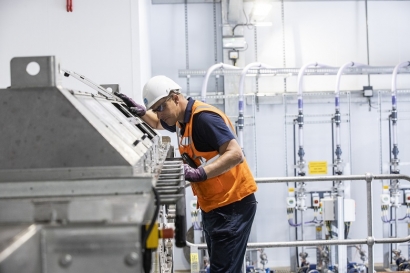
The UK’s largest water company created almost 140 million cubic metres of green biogas during the sewage treatment process. This was transformed in to more than 300 million kilowatt-hours of electricity, the amount needed to power more than 140 million metres of fairy lights – which would stretch around the earth’s circumference four times.
In June, Thames Water announced it is committed to leading the future of energy transition by transforming the way it creates and uses power to become net carbon zero by 2030, with generating renewable power from waste as an important part of this plan.
Biogas is created by feeding sludge, a by-product of the sewage treatment process, in to special “digester” tanks where a process called anaerobic digestion takes place. The energy produced can then be used to power sewage treatment works, preventing the use of fossil fuels and protecting the environment.
Crossness sewage works in Greenwich was the biggest producer of renewable energy in the last 12 months, churning out more than 18.5 million m3, enough to cook 15 million turkeys, while Mogden sewage works in Twickenham and Beckton in Newham racked up about 18 million and 12 million m3 each.
Matt Gee, Thames Water’s energy & carbon strategy & reporting manager, said, “Creating our own clean, green energy is an important part of our sewage treatment process and we’re generating more and more each year.
“Doing this allows us to power our sites with renewable and eco-friendly fuels, and as we continue to generate more, we want to export it to be used in our local communities.
“This is just a part of our long-term plan to be net carbon zero by 2030, which is a key part of our company-wide turnaround plan to ensure we perform in the way that our customers, communities and the environment expect from us.
“We know we’ll need to work alongside other companies from a range of industries to ensure we protect the planet for future generations and encourage everyone to look at sustainable and eco-friendly solutions.”
Eliot Whittington, Director of the UK Corporate Leaders Group, of which Thames Water is an active member, added, “As more and more of the world sets strong targets for climate change, it’s essential that action follows that ambition.
Karen Gibbs, Senior Policy Manager at CCW, said, “Reducing carbon emissions is essential in tackling the climate crisis and protecting the environment and our precious water supplies, now and in the future.
“Green energy schemes, like those Thames Water is delivering, play a vital role as the water industry works towards achieving net zero carbon emissions by 2030 – two decades ahead of national targets.”
Thames Water has already cut emissions by almost 70% since 1990. The UK’s largest water supplier, which has been producing renewable energy at Mogden sewage works in London since the 1930s, is also aiming to protect the planet and its 15 million customers’ water supply for the future by becoming carbon negative by 2040.
The company’s comprehensive plan includes reducing the use of fossil fuels across the business, using solar power and heat recovery schemes, and working with sustainable suppliers and partners.
Earlier this year, scientists from Thames Water perfected the art of transforming sewage into green electricity at peak times of the day to cut the company’s energy bills and help meet the UK’s carbon targets.
Britain uses the most power between 4pm and 7pm, when many families are at home using energy-hungry appliances like ovens, dishwashers and kettles. To help save money on its own bills, Thames Water worked with sustainability experts at the University of Surrey on a four-year project to boost the production of biogas from human waste, which can then be used to generate enough electricity to power its sewage treatment sites during this peak period.

